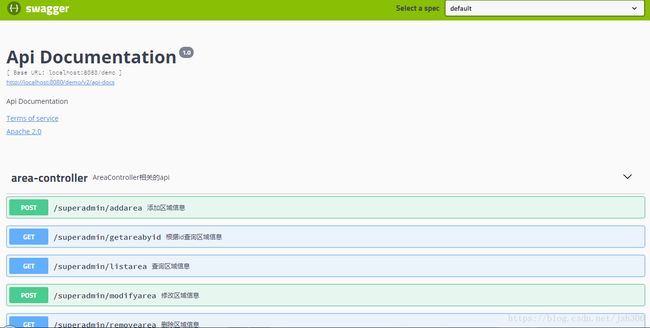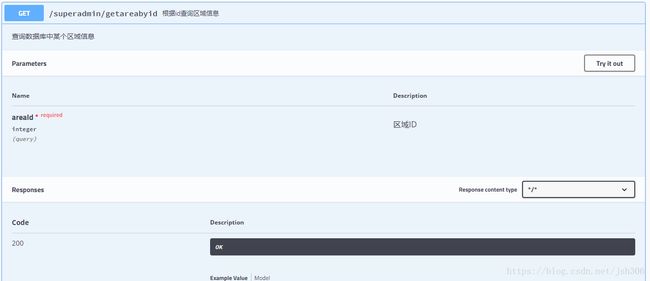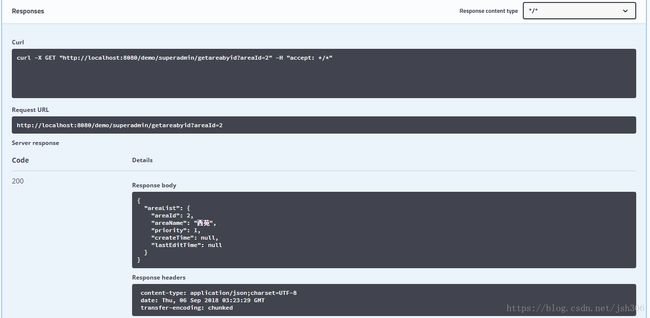SpringBoot结合swagger自动生成API文档
Web开发常采用前后端分离的方式。前后端通过API进行交互,在Swagger UI中,前后端人员能够直观预览并且测试API,方便前后端人员同步开发。
在SpringBoot中集成swagger,步骤如下:
1.将下面的依赖添加到Maven项目的pom.xml文件中。springfox-swagger2组件帮助我们自动生成描述API的json文件,而springfox-swagger-ui组件就是将这个json文件解析出来,用一种更友好的方式呈现出来。
io.springfox
springfox-swagger2
2.8.0
io.springfox
springfox-swagger-ui
2.8.0
2.添加Swaager的配置类
package com.example.demo.config;
import io.swagger.annotations.ApiOperation;
import org.springframework.context.annotation.Bean;
import org.springframework.context.annotation.Configuration;
import springfox.documentation.builders.RequestHandlerSelectors;
import springfox.documentation.spi.DocumentationType;
import springfox.documentation.spring.web.plugins.Docket;
import springfox.documentation.swagger2.annotations.EnableSwagger2;
@EnableSwagger2
@Configuration
public class SwaggerConfig {
@Bean
public Docket swaggerSpringMvcPlugin() {
return new Docket(DocumentationType.SWAGGER_2).select().apis(RequestHandlerSelectors.withMethodAnnotation(ApiOperation.class)).build();
}
}3.在需要暴露的API上添加需要在Swagger UI页面上显示的应用相关的介绍信息。举个例子吧~
在Controller类上添加@API注解,说明该类的作用;该类下包含增删改查五个方法,给大家一个全面的示范,至于service、dao层的实现,留给大家自己发挥吧~主要是在方法上添加@ApiOperation,@ApiImplicitParam注解,作用是对方法以及参数的说明。
package com.example.demo.controller;
import com.example.demo.service.AreaService;
import io.swagger.annotations.Api;
import io.swagger.annotations.ApiImplicitParam;
import io.swagger.annotations.ApiOperation;
import org.springframework.beans.factory.annotation.Autowired;
import org.springframework.web.bind.annotation.*;
import com.example.demo.entity.Area;
import java.util.*;
@Api(description = "AreaController相关的api")
@RestController
@RequestMapping("/superadmin")
public class AreaController {
@Autowired
private AreaService areaService;
@ApiOperation(value="查询区域信息" ,notes = "查询数据库中所有区域信息")
@RequestMapping(value="/listarea" , method = RequestMethod.GET)
private Map listArea(){
Map modelMap = new HashMap() ;
List list = areaService.getAreaList();
modelMap.put("areaList" , list);
return modelMap;
}
@ApiOperation(value="根据id查询区域信息" ,notes = "查询数据库中某个区域信息")
@ApiImplicitParam(name="areaId",value="区域ID",paramType="query",required = true,dataType = "int")
@RequestMapping(value="/getareabyid" ,method = RequestMethod.GET)
private Map getAreaById(@RequestParam("areaId") Integer areaId){
Map modelMap = new HashMap() ;
Area area = areaService.getAreaById(areaId);
modelMap.put("areaList" , area);
return modelMap;
}
@ApiOperation(value="添加区域信息",notes="根据Area对象添加区域信息")
@ApiImplicitParam(name="area",value="区域信息",required=true,dataType="Area")
@RequestMapping(value="/addarea" ,method = RequestMethod.POST)
private Map addArea(@RequestBody Area area){
Map modelMap = new HashMap() ;
modelMap.put("success" ,areaService.addArea(area));
return modelMap;
}
@ApiOperation(value="修改区域信息",notes="根据Area对象修改区域信息")
@ApiImplicitParam(name="area",value="区域信息",required=true,dataType="Area")
@RequestMapping(value="/modifyarea" ,method = RequestMethod.POST)
private Map modifyArea(@RequestBody Area area){
Map modelMap = new HashMap() ;
modelMap.put("success" ,areaService.modifyArea(area));
return modelMap;
}
@ApiOperation(value="删除区域信息",notes="根据区域ID删除区域信息")
@ApiImplicitParam(name="areaId",value="区域ID",required=true,dataType="int")
@RequestMapping(value="/removearea" ,method = RequestMethod.GET)
private Map removeArea(@RequestParam("areaId") Integer areaId){
Map modelMap = new HashMap() ;
modelMap.put("success",areaService.deleteArea(areaId));
return modelMap;
}
}
4.启动SpringBoot项目,访问http://localhost:8080/demo/swagger-ui.html页面,注意了,我这里是因为在application.properties配置了项目路径server.servlet.context-path=/demo,所以才在上面的url加上/demo,一般若无特殊的配置,直接访问http://localhost:8080/swagger-ui.html即可。
Swagger UI界面绝对有颜有值!画面小清新,而且API非常直观。点击页面上的url,可查看API文档api-docs,不仅如此,咱们是可以测试接口的哟~简单测个 根据id查询区域信息 的接口吧,点击将其展开。
点击 Try it out ,咱们得输个int类型的区域ID做参数,输入完后点击execute后就可以看到结果啦!
迟到两年的swagger,算是正式认识了。
日ji


